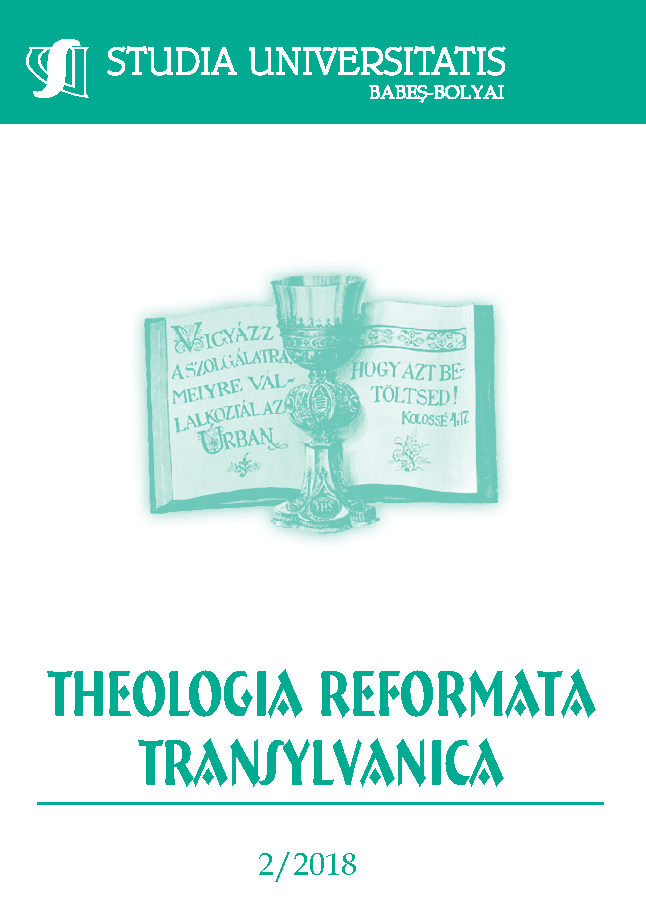Christian Education for a Generation of Amusement
DOI:
https://doi.org/10.24193/subbtref.63.2.11Keywords:
Christian Education, amusement society, boredom, play, dialogue, meta-narrativeAbstract
The expectations of the children of our “amusement society” are different to what they used to be a generation or two ago. I highlight a few aspects, which might be relevant (albeit not new) to how we address contemporary young people. I would like to raise awareness of aspects which are still indispensable and which have probably gained importance for the process of Christian Education, not because they are novel, but because they are fundamental. What has not changed, is the need for real human relationships, the importance of personal involvement, and the delight of performing meaningful tasks. At Christain Education, pupils not only learn about something, but they are also invited into the in-between space of a dialogue with God. This involves learning by doing, experimenting with practices, which are in line with our spiritual heritage, and which offer our pupils a chance to engage in dialogue with God (prayer, meditation, silence, fasting, journaling, singing etc.).References
ANDERSEN, T.: A visszajelző csoport – Párbeszéd a párbeszédről. Animula, Budapest, 1990.
BATTA István: A spiritualitás újra-felfedezése a kálvinizmusban. Doktori disszertáció. Selye János Egyetem Református Teológiai Kar, Komárom, 2014.
BAUMAN, Z.: Society under Siege. Polity Press, Cambridge, 2002.
BAUMGARTNER, I.: Pasztorálpszichológia. Semmelweis Egyetem TF/ Párbeszéd (Dialógus) Alapítvány / HÍD Alapítvány, Budapest, 2003.
BELLAH, R. N.: Religion in Human Evolution – From the Paleolithic to the Axial Age. Harvard University Press, 2011.
BERRYMAN, J.: Godly Play – An Imaginative Approach to Religious Education. Augsburg, Minneapolis, 1994.
BLAIKIE, N.: Approaches to Social Enquiry. Polity Press, Cambridge, 1995.
BROWN, J. S. – DUGUIT, P.: Organizational Learning and Communities-of-Practice – Toward a Unified View of Working, Learning, and Innovation. In: Organisation Science, Vol 2. no. 1. 1991. 40–57.
DALFERTH, I. U.: The Experience of God. In: GUNDLACH, T. – BECKER, R. – KIENE, H. – MERZYN, K. (eds.): Trusting in God in New Ways. Church Office of the Evangelical Church of Germany, Evangelische Kirche Deutschland (EKD), Hannover, 2017. 22–25.
DÖRGER, H. J.: Heilige und andere Menschen – Gedanken zu vier Fernseh-Meditationen. In: Grözinger, A. – Luther, H. (Hgs.): Religion und Biographie – Perspektiven zur gelebten Religion. Kaiser, München, 1987. 261–272.
FECHTNER, K.: Praktische Theologie als Erkundung – Religiöse Praxis im spätmodernen Christentum. In: HAUSCHILD, E. – SCHWAB, U. (Hgs.): Praktische Theologie für das 21. Jahrhundert. Kohlhammer, Stuttgart, 2002. 55–67.
FELDMÁR András: Életunalom, élettér, életkedv. HVG Kiadó, Budapest, 2014.
FRIEDMAN, E. H.: Nemzedékről nemzedékre – Családi folyamatok egyházi és zsinagógai közösségben. Exit Kiadó, Kolozsvár, 2008.
GERKIN, C. V.: Prophetic Pastoral Practice – A Christian Vision of Life Together. Abingdon Press, Nashville, 1991.
KENNY, L.: Boredom Escapes Us: A Cultural Collage in Eleven Storeys. University of Toronto, ProQuest Dissertations Publishing, 2009.
KOCSEV, M.: Gyakorlati teológiai témák – Elmélet és praxis, az igehirdetés személyközpontúsága és a szupervízió. Habilitációs dolgozat. KRE–HTK, Budapest, 2007.
MÁTÉ-TÓTH András: Vallásnézet – A kelet-közép-európai átmenet vallástudományi értelmezése. Korunk – KompPress, Kolozsvár, 2014.
MEYER-BLANK, M.: Vom Symbol zum Zeichen - Symboldidaktik und Semiotik. Lutherisches Verlagshaus, 1995.
MIHÁLYFI Ákos: A papnevelés története és elmélete. I. kötet. Szent István Társulat, Budapest, 1896.
MILLER, L. – ATHAN, A.: Spiritual Awareness Pedagogy: the Classroom as Spiritual Reality. In: International Journal of Children’s Spirituality, Vol. 12, No. 1, April 2007. 17–35.
MIKLYA LUZSÁNYI Mónika: Ót és újat – Vallási-teológiai elemek a digitális nemzedék világképét meghatározó művekben, különös tekintettel a keresztyénségre. In: Theológiai Szemle, 2015/4. 233–241.
OEHLMANN, C. G.: Einfach erzählen! – Ein Übungsbuch zum Erlernen des mündlichen Erzählens. Paderborn, Junfermann, 2001.
POHL-PATALONG, U.: Seelsorge zwischen Individuum und Gesellschaft. Kohlhammer, Stuttgart, 1996.
RITSCHL, D.: Zur Logik der Theologie – Kurze Darstellung der Zusammenhänge theologischer Grundgedanken. Chr. Kaiser Verlag, München, 1984.
SCHULZE, G.: Die Erlebnisgesellschaft – Kultursoziologie der Gegenwart. Campus, Frankfurt a.M., 1992.
SCHULZE, G.: Élménytársadalom, A Jelenkor kultúrszociológiája, A mindennapi élet esztétizálódása (részlet az 1. fejezetből). In: Szociológiai Figyelő, 1–2, 2000. 135–157.
SIBA Balázs: Life Story and Christian Metanarration – The Importance of the Research Results of Narrative Identity to Practical Theology. L’Harmattan – Károli Gáspár Református Egyetem, Budapest, 2013.
SIBA Balázs: Spirituális útkeresés és a református lelkiség – lelkészinterjúk fényében. In: Theologiai Szemle, 59:(3), 2016. 158–169.
SINEK, S.: Leaders Eat Last: Why Some Teams Pull Together and Others Don't. Penguin Books, New York, 2014.
STREIB, H.: Faith Development Theory Revisited – The Religious Styles Perspective. In: The International Journal for the Psychology of Religion 2001/3, 2001. 144–158.
SVENDSEN, L.: A Philosophy of Boredom. Reaktion Books, 2005.
SZABÓNÉ LÁSZLÓ Lilla: A gyermekteológia vizsgálata a kisgyermekes keresztyén családok életében. PhD-értekezés. Budapest, 2015.
SZÉNÁSI Lilla: Isten és ember találkozásának színtere – A 21. század katechetikai kihívásai és lehetőségei, különös tekintettel a Z generáció hittanoktatásában használatos IKT eszközökre és anyagokra. Doktori értekezés. Komárno, 2017.
TAYLOR, J.: A digitális nemzedék nevelése – Hogyan válhat gyermeke tudatos médiafogyasztóvá. Móra Könyvkiadó, Budapest, 2016.
TWITCHELL, J. B.: Shopping for God – How Christianity Went from in Your Heart to in Your Face. Simon & Schuster, New York, 2007.
VÁRADI Ferenc: Gyermekkor és médiahasználat – „kényelmetlen közkérdések”: A kézikönyvírás szükségességéről, nehézségeiről és lehetőségeiről. In: Spannraft Marcellina – Korpics Márta – Németh László (szerk.): A család és a közösség szolgálatában: Tanulmányok Komlósi Piroska tiszteletére. L'Harmattan – Károli Gáspár Református Egyetem, Budapest, 2016. 259–268.
Downloads
Published
How to Cite
Issue
Section
License
Copyright (c) 2018 Studia Universitatis Babeș-Bolyai Theologia Reformata Transylvanica

This work is licensed under a Creative Commons Attribution-NonCommercial-NoDerivatives 4.0 International License.






